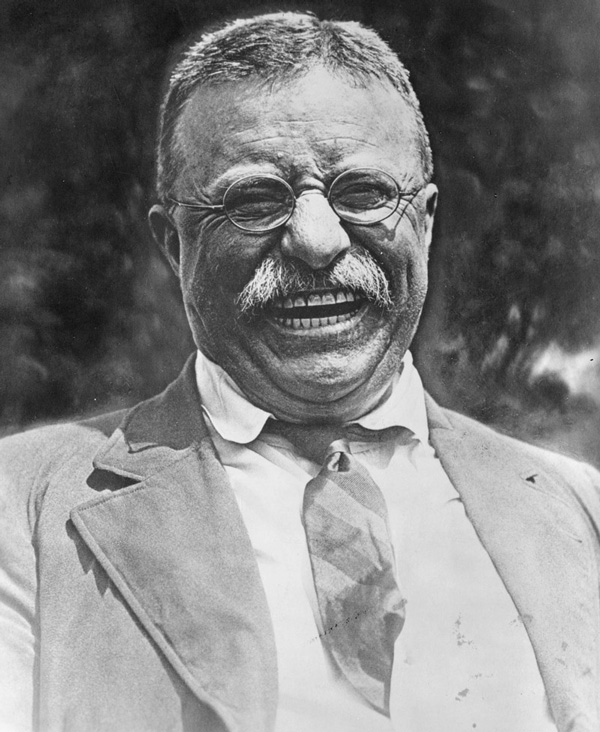Theodore Roosevelt died on Monday, January 6, 1919. It’s a fitting time to take stock of TR and his legacy amid the challenges of a new century.
The winter of 1918-1919 was memorably cold in many parts of the world. When the guns of the Great War finally fell silent on November 11, 1918, people everywhere confronted realities that were as bleak as the disfigured landscapes of the most contested battle fronts. Empires had fallen. The legitimacy of remaining monarchical institutions was evaporating rapidly in the light of a new dawn of national and individual self-determination. The victors were themselves vanquished. The certainties of the long peace of the Victorian and Edwardian eras gave way to the madness of Dada.
America’s emergence as a world power was unmistakable if bittersweet. No family was untouched by the carnage. Theodore Roosevelt, emblematic as “the typical American,” wore the black armband of mourning. His beloved youngest son Quentin died in a dogfight above France in July 1918. The legends of the age of chivalry were jarringly out of place in a time of impersonal, industrialized slaughter. The Roosevelt family’s grief was sharpened and shared by the graceless postcards of photographs of Quentin’s lifeless body splayed next the wreckage of his plane.
The ex-president, recipient of every honor the world could bestow, expressed solidarity with the other Americans by his wish to be addressed as Colonel Roosevelt. In the late weeks of 1918, his failing health descended in an accelerating spiral. Amid many challenges, one may have become paramount: a broken heart.
After putting final touches on an op-ed, Theodore Roosevelt died peacefully in his bed in the early morning hours of Sunday, January 6, 1919.
Though the former president had been in and out of hospital in the winter of 1918, the indelible public image of his extraordinary vitality rendered his death unexpected. Vice President Marshall observed, “Death had to take him in his sleep, for if he was awake there’d have been a fight.”

Roosevelt in Retrospect
Friend and foe alike recognized that Roosevelt’s death constituted a historical caesura. TR molded himself into a representative figure of his era. His project of self-creation and service renders him timeless.
Shortly after Roosevelt’s death, his literary friend and kindred spirit Rudyard Kipling commemorated his life and legacy with a poem, “Great Heart.” It begins:
CONCERNING brave Captains
Our age hath made known
For all men to honour,
One standeth alone,
Of whom, o’er both oceans
Both Peoples may say:
“Our realm is diminished
With Great-Heart away.”
To be sure, there were contemporary critics consumed by bitterness against Roosevelt and the values he advocated. Among them was young Ernest Hemingway, who had idolized TR and his robust combination of the life of action with the life of thought. The Rough Rider’s personification of the romantic vision of war as a cleansing agent of patriotism was sufficiently persuasive to ensure that his reputation would be swept up in the sense of futility and betrayal suffered by many in reaction to the grim realities of the Great War. Hemingway’s sentiments hardened in the cold isolation left behind by fallen idols:
Workingmen believed
He busted trusts,
And put his picture in their windows.
“What he’d have done in France!”
They said.
Perhaps he would—
He could have died
Perhaps,
Though generals rarely die except in bed,
As he did finally.
And all the legends that he started in his life
Live on and prosper,
Unhampered now by his existence.
Elihu Root’s Summation
Roosevelt’s enduring place in American history was discerned by thoughtful individuals able to take the longer view.
Elihu Root—the embodiment of the lawyer-statesman in American life—summarized TR’s historical contribution in a speech in late 1919:
Review the roster of the few great men of history, our own history, the history of the world; and when you have finished the review, you will find that Theodore Roosevelt was the greatest teacher of the essentials of popular government the world has ever known.
He was not different, not some strange phenomenon unlike the rest of us. He was like us all, only more so.
He did more than to solve the questions of his time. He presented to our country and to the world a great and inspiring example to enforce his teaching; it is not what he did, but what he became. The man was the spirit he worked in….The perpetual lesson of a great example, inseparably tied to a great truth, carries on the work of a lifetime through generations and ages to come.
Roosevelt’s 21st Century Legacy
In one sense, Roosevelt is the most approachable of historical figures. His larger-than-life persona bursts from photographs, films and writing. We feel drawn to his energy and familiarity. It’s as if this individual, born in 1858 and whose life ended in sync with the armistice, is someone we know. Many of the challenges we face in the twenty-first century would be familiar to him.
Yet he’s more than a comforting apparition. His example is also a challenge, reminding us of our debts to the past and obligations to the future.
In our moment, with so much seeming uncertain or even precarious, Roosevelt’s example has special resonance. TR personified fundamental American ideals and led a successful political project of updating our national narrative to bring in a more expansive and inclusive notion of national identity. His example has much to teach us as we undertake that task anew.
Theodore Roosevelt Legacy A Century On
